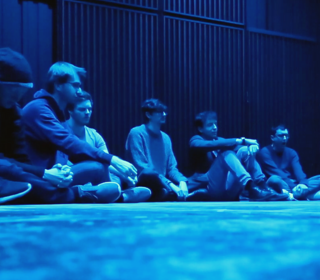
Blog

Regular blogger Emily Abdy, a composer who completed the BMus undergraduate degree in 2019 and has progressed on to study a Masters in Composition at Royal Birmingham Conservatoire, explains what her experience has been like as both a continuing student, and a ‘new’ postgraduate at RBC.
This September I started my postgraduate degree in music composition at Royal Birmingham Conservatoire, having completed my undergraduate degree at RBC the summer before. I felt as I expect most students commencing a course feel – nervous and excited – but, for me, there was an alien element of being both new and not new at an institution, and in that sense I didn’t know what to expect.
I had already been studying at RBC for four years and graduated with a BMus (Hons) in Composition. I had enjoyed my time as an undergraduate student so much, yet still felt I had more progress to make and more things to learn. I know that at my core as a person learning is what I enjoy most and, after a little deliberation, immediate further study seemed like the obvious choice. For me, the Composition Department at RBC felt the best place to do this. They were supportive of me as an artist, but continued to encourage me to explore different avenues in my work, in a building which was well-equipped for me to do so. I had built up a sense of momentum with my work that I didn’t want to lose by taking a year away from study, or moving to another institution.
I already knew the staff and students in the Composition Department and it was rewarding during welcome week to confidently answer some of the questions that other new postgraduate students had about how things work, and show them around both the conservatoire building and Birmingham. This process also helped me a lot to get settled into my new ‘identity’ as postgraduate student – because at first it did feel a little strange to still be at the Conservatoire when all of my peers in my previous year group had left.
There’s a risk that composition, which doesn’t always involve the social aspect that orchestral and ensemble playing provide, can become a solitary pursuit. So I felt a sense of responsibility, as someone with a foot in both camps, to help the new and current students socialise and settle in the new academic year. Department night – where members of each musical department hold a social event to get to know each other and welcome new students – is one of the most important events of welcome week, and the composers made no exception. We also organised smaller social events ourselves throughout the first couple of weeks, and continue to do so.
During this time I also had to pick my postgraduate modules. We were given short talks and printed information on module content and assessment methods to help us make a more informed decision. The modules on offer all seemed interesting and valuable in different ways, which made it a more challenging decision, but it was perhaps slightly easier for me as a continuing student than it was for students who were completely new to RBC, because I had already studied some of the subjects on offer during my undergraduate degree; so I ruled these out in favour of trying something completely new.
I am currently studying a new module called 'Experimental Performance in Context(s)' with Dr Andy Ingamells and another called 'Contemporary Music Concepts and Practice' with Dr Seán Clancy. I look forward to both classes each week and they helped reaffirm that my decision to continue studying was the right one, as I feel what I learn academically is both interesting on its own and has a positive effect on my work as an artist. Additionally, the Conservatoire are running a brand new course in Experimental Performance which is linked closely with the Composition Department. I have already had the opportunity to take aspects of learning from the new course and work with the different kinds of artists who are now also studying here on the new course.
The Master’s composition degree is structured in a way which means you can tailor it to your specific interests. I only have three days where I have structured classes, but there are lots of additional opportunities to fill out your schedule and the workload is enough that the time to experiment and develop ideas, with the use of the conservatoire’s facilities, is appreciated. I even get to sit in on a class which I didn’t have the time to take in the third year of my undergraduate degree, which is a welcome relief from the pressure of assessment but also adds to my overall knowledge.
Now a couple of months in, I am extremely grateful to undergraduate me, who decided it would be a good idea to continue studying at RBC. My undergraduate degree provided a safe space for me to explore different ideas under the guidance of experienced tutors that encouraged me to try new ways of working. Whereas now, it seems like my postgraduate degree will give me the opportunity to take the ideas that most resonate with me as an artist, then refine and develop them further into something I can feel accurately represents my artistry. This is my main goal for the duration of the next two years I have here, as well as enjoying the experience of it all.
Royal Birmingham Conservatoire Music Courses
Find out more about our courses